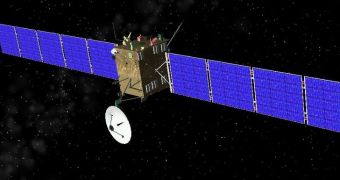This coming August 6 is expected to be a one-of-a-kind sort of day for space exploration. Thus, it is on this date that a spacecraft is expected to rendezvous with a comet for the first time ever.
As detailed by folks with the European Space Agency, the spacecraft in question goes by the name of Rosetta. Its target space rock is known to astronomers and space enthusiasts as Comet 67P/Churyumov-Gerasimenko.
Information shared with the public says that, come Wednesday, the Rosetta spacecraft is expected to start orbiting Comet 67P/Churyumov-Gerasimenko. Specifically, it will accompany it as it goes round the Sun.
Should things go according to plan, the Rosetta spacecraft will later this year attempt to deliver a lander dubbed Philae to the comet's surface. This mission is scheduled to take place sometime in November.
“On 6 August, after a decade-long journey through space, ESA’s Rosetta will become the first spacecraft in history to rendezvous with a comet,” the European Space Agency writes in a press release concerning this achievement.
Furthermore, “After rendezvous on 6 August, Rosetta will accompany the comet around the Sun and as it moves back out towards the orbit of Jupiter. The lander, Philae, will be delivered to the comet’s surface in November 2014.”
The specialists in charge of seeing this space exploration project through say that, once on the surface of Comet 67P/Churyumov-Gerasimenko, the lander is to get to work collecting samples documenting the makeup of the space rock's body, Space informs.
Philae is expected to also spend some time snapping photos of the comet's surface appearance, and to help shed new light on what the rest of space looks like when observed from atop this celestial body. This data will hopefully lead to a better understanding of the solar system.
The Rosetta spacecraft left Earth over a decade ago, on March 2, 2004. It has since then covered a distance of over 6 billion kilometers (4 billion miles), and has even passed by Mars and two asteroids, the European Space Agency explains.
Still, the spacecraft has not exactly got to make the most of its impressive journey through space. Thus, Rosetta spent as many as 957 days in hibernation, and was only woken up this past January 20 in order to prepare for its encounter with its target comet.
Commenting on the Rosetta spacecraft's upcoming rendezvous with Comet 67P/Churyumov-Gerasimenko, project scientist Matt Taylor points out the fact that “All this will provide us with an unprecedented view of a comet, its nucleus and coma and how this all works!”

 14 DAY TRIAL //
14 DAY TRIAL //